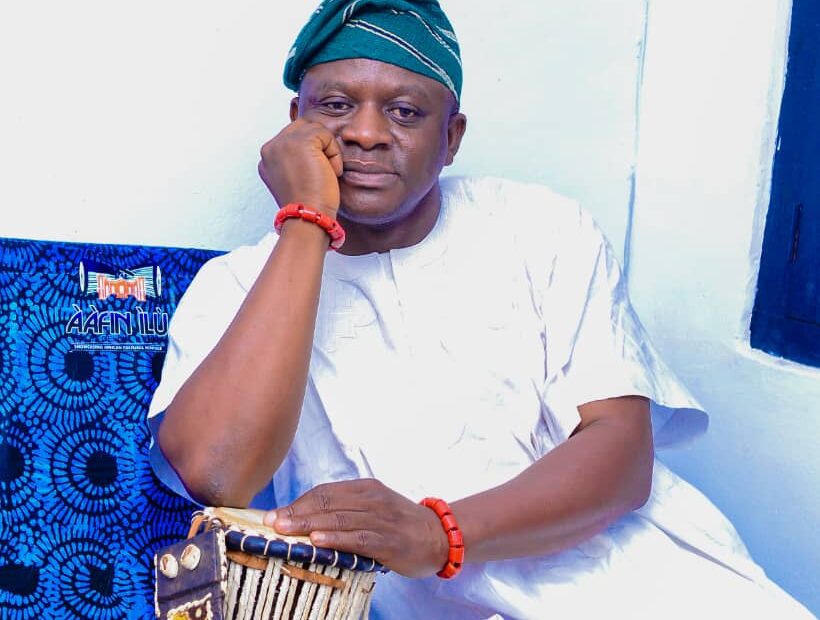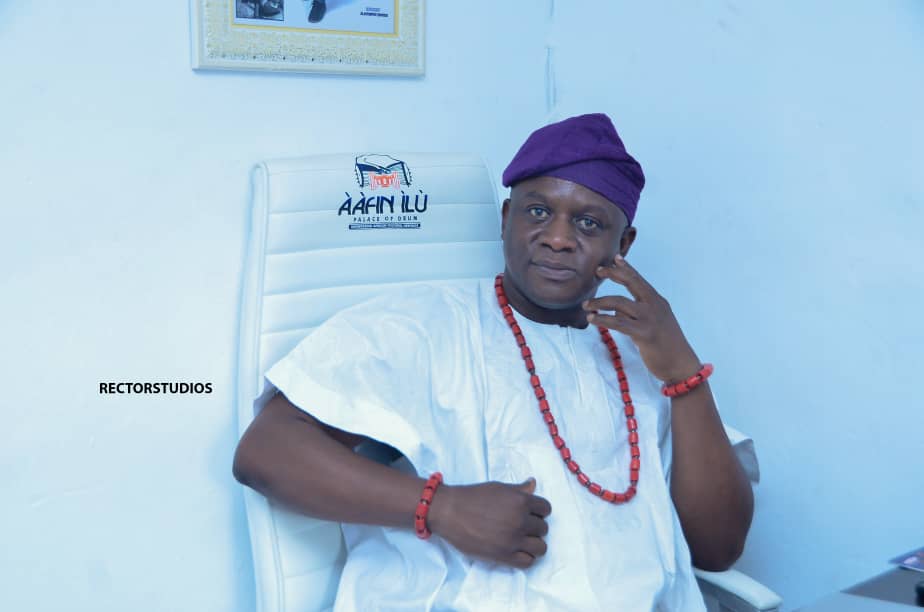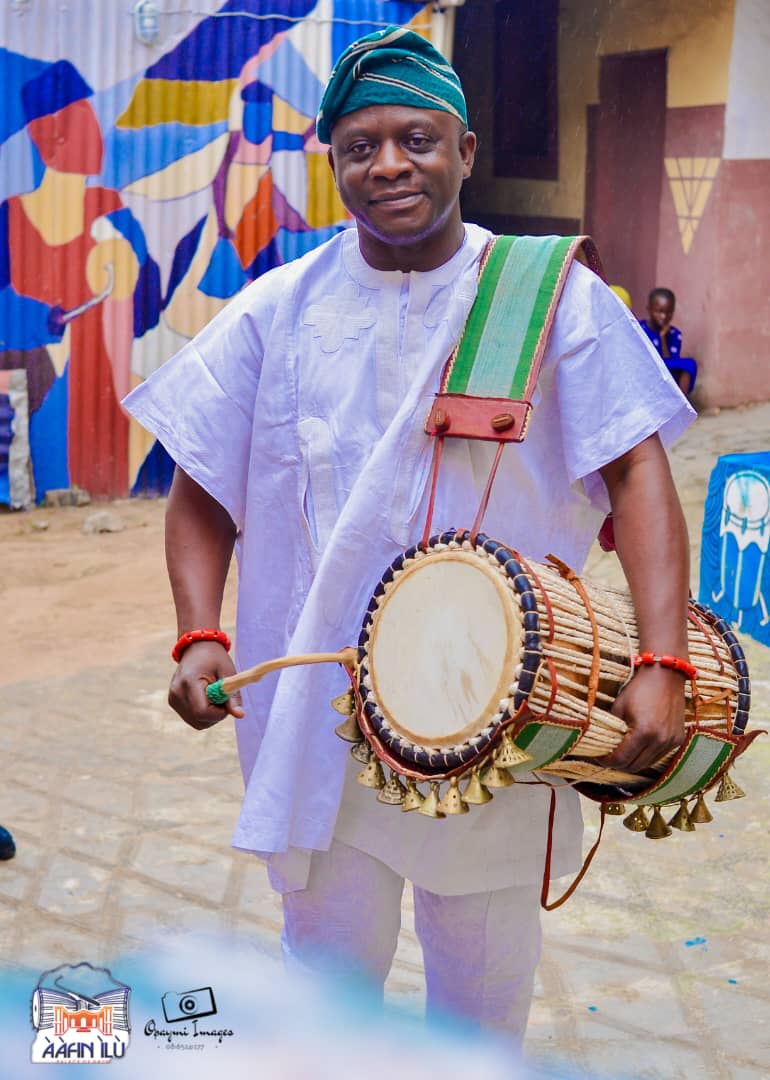I stepped into the shoes of my father, Oba Laoye, to promote African, Yoruba culture and tradition – Prince Adewale, founder of Aafin Ilu, The Drummer of Peace

Clement Adeyi
Prince Adewale Laoye is the founder and Chief Executive Officer (CEO) of Aafin Ilu. His stage name is Drummer of Peace. He is a drummer of Yoruba descent preoccupied with promotion of African and Yoruba cultural and and traditional values and heritage.
In this interview, he spoke glowingly on the virtues of his trade, how to survive the current hardship in the country, the need to preserve the cultural and traditional values as well as development of the arts industry.
Your father, Oba Adetoyese Laoye I and former Timi of Ede, was a quintessential and legendary drummer. He left his bold footprints in the sand of time in promotion of Yoruba culture and tradition. Since you stepped into his large shoes to continue the legacies that he left behind, to what extent have you lived up to expectations in showcasing his legacies?
The memories of the legacies set by my father continue to linger on until I stepped into the large shoes he left behind, trying to propagate the legacies. He was a drummer king. He was an expert who could use talking drum to communicate with people. He was a dancer, drummer, musicology and story teller. He was former Chairman of National Antiquity Commission now known as National Museum. He was the one that put Nigeria and Ede on the world map of culture and tourism in the 50s-70s.

My father got his drum from his mother’s lineage because his mother is from a drumming family. He had the opportunity to stay there when he was growing up.
According to Yoruba culture, drums are always positioned at the front gate of a palace. When he became the Timi of Ede, he used the opportunity to use drumming to propagate the culture and tradition of Yorubaland. In the circumstance, he became a household name and exponent in talking drum.
He was an iconic artist in the use of drum and music to promote Yoruba Culture and tradition.
I continued the legacy from where he stopped after developing the passion for it right from my childhood. I acquired the skill from my paternal grandma. I got my first drum when I was three months old. I continued from where my father stopped to advance the great legacies that he had set and maintained till his demise many years ago. I can’t do anything without telling his story. It is quite interesting to recall that my father inherited the drumming spirit from his mother’s family when he was growing up there. I can say that my career in drumming is hereditary because I also inherited it from my paternal grandma and I am now continuing the legacy from where my father stopped.
Determined to take the passion to an enviable height, I founded Aafin Ilu the (Palace of Drum) where we use drums to promote Yoruba culture and tradition. My stage name is “Drummer of Peace.” My fans and boys gave me the name because I preach messages of peace in my performances.
Since I started, God has been helping me to excel by actualising the vision and mission in appreciable measures.
At Aafin Ilu which is located in the ancient town of Ede, my homestead, we showcase and keep drums as artefacts where people from different walks of life, including culture enthusiasts, custodians of Yoruba culture and tradition as well as students, come on excursion for research and to also tap from the legacies we are setting to propagate them in a wider perspective. They also collaborate with us in the drive to maintain the legacies at their various domains in optimal proportions.
We are into tourism, art and culture as well as music. It is an art centre where we keep our drums, music, songs, local attire and Yoruba language. The Yoruba language is strategic to our programmes since it is a medium of communication. Drums can talk. We use them to pass messages, recite memories of great kings, deities and lovers through rhythms.
Apparently, the current harrowing hardship in the country is threatening relative peace, following the recent spate of peaceful protests in some parts of the state, to press for improved living conditions, including your home state, Osun. As a drummer of peace, what are you doing to encourage peace and discourage violence?

I am currently working on a special project in a studio to pass messages to governments and the citizens on how to survive the hardship. As a drummer of peace, I will use drums to pass messages of peace to government to do its best by giving some measure of lifeline to assuage people’s plight.
I will also pass a message to the privileged people and those that have a steady means of livelihood to show love towards others who do not have. They should be their brothers’ keepers by helping them. Those that are in the position to help should help those that are in need.
Although the hardship does not exempt anybody, there are privileged people that are in a better position to help the less privileged who do not have the means to survive. The privileged who are better off should try their best in anyway they can to help others. Neighbours should show good neighborliness towards their neighbours instead of being selfish and looking away and not showing concern even when they see that their neighbours are starving. Those who can afford three square meals should give one square to those who can’t afford even one. The privileged people could organise palliatives for the less privileged in their streets. It’s not the duty of only government to give hardship palliatives. Churches and mosques could also come up with such initiatives to show the love that they preach. It’s even a part of evangelism and soul winning.
Not only the privileged people but also those that have the means should do so in their offices too.
The ongoing Ramadan period is a good time and an ample opportunity to show such love and kindness. The privileged people should not wait till the helpless people beg them before they help them.
What is your assessment of the Arts and Culture Ministry and your message to government?
Government should preserve and promote our cultures and traditions. The Ministry of Arts and Culture at both federal and state levels should live up to their responsibilities by supporting arts and culture practitioners and artists. They should improve on tourism and cultural programmes.
There are many tourism centres in different states of the federation. Government should develop them maximally to tap from their potentials. Those already developed should be improved upon to generate employment and revenue. I am working towards the project in Osun, my home state.
Cultural imperialism has continued to pose opposition to our culture and tradition, especially in the area of its influence on dressing. As a culture and tradition promoter, How do you use your programme to safeguard African culture from dressing perspective?
I have a programme in the pipeline to address dressing culture in our society. Provocative dressing as well as dressing that depopularize our cultural values have to be addressed. We must not give room to cultural imperialism whereby our women, especially the youths, wear European and Americn dresses more than African ones. The programme titled: “Ki lo wo? ,” in Yoruba parlance which means, what do you wear? is intended to correct dressing errors in our society.
The programme is targetted at students of tertiary institutions who are fond of indecent dressing, especially the female folks who dress seductively by exposing their cleavages as well as the males who sag their trousers and shorts.
I always take the campaign against such dressing to campuses during fresh students’ orientation programmes. I also use the programme to preach peace message to address the menace of cultism on campus to encourage students to live in peace and love one another.
I embark on this initiative because if such spirit is instilled in them on campus, they could always extend it to the larger society. This could go a long way in giving us the peaceful society that we all yearn for.
The insecurity and criminal societies we are having today are due to poor peace orientation and messages among our youths. That is why the campus peace programmes I am galvanising is very crucial. We also use our performances to pass messages of peace with a view to addressing the insecurity challenge in the land.
In what ways have you used Aafin Ilu (Drummer of Peace) so far to add value to the society?
For a long time now, our programmes have been a source of inspiration to the youths who come to the centre to practise and take a career in arts, especially drumming and messages on culture and tradition.
Recently, about 45 undergraduates completed their SIWES at the centre. Two years ago, we had 20 of them, while we had 28 last year. Others come to do their IT at the centre, especially undergraduates of Library and Information Studies as well as Theatre Arts. Our museum is a special centre where they hold the programme.
What they learn here are things they can’t learn in their classrooms in their schools.
Aafin Ilu is now more of a tourism centre because people from different walks of life as well as culture enthusiasts come to the centre for research and to access messages that we pass through drums. It also contributes to the economy of the state because transporters, hospitality centres, especially hotels, marketers of items and commodities get patronage from visitors, students and people that come to the centre. Expatriates who also come to the centre on holiday and for research spend their dollars in Nigeria. This also helps to boost the economy of the state.
We have a Drum Academy where people come to learn how to play drums, music, how to market them and how to use the art to pass messages on different issues especially culture and tradition.
You picked the courage to step into the shoes that your father left behind. To what extent are you fulfilled in fulfilment of your dream to continue the legacies that your father left behind?
I am very much fulfilled because since I emerged in the terrain, I have been able to live up to expectations by fulfilling my vision and mission. Aafin-Ilu, the Drummer of Peace has come to stay. It has grown beyond an entity beyond Ede and Yoruba land and translated to a global phenomenon. I have participated in global programmes several times with great reckonings. In May last year, I participated in a global musical extravaganza organised to preach message of peace during the war in Ukraine. Beyond promotion of the Yoruba culture and tradition which is our major preoccupation, Aafin-Ilu galvanizes economic growth locally and globally. It is also a means of livelihood and employment, especially for the youth. It has also inspired some progress and development in not only Ede land which is the Aafin-Ilu base, but also in the entire Yoruba land.
The Insight Report
Nigeria Coverage



